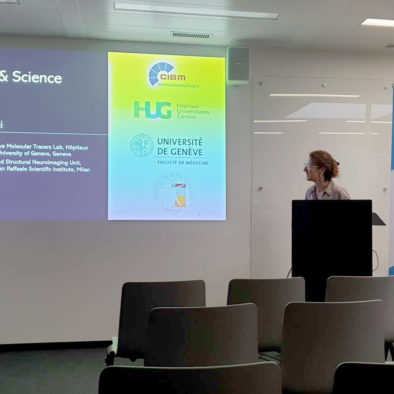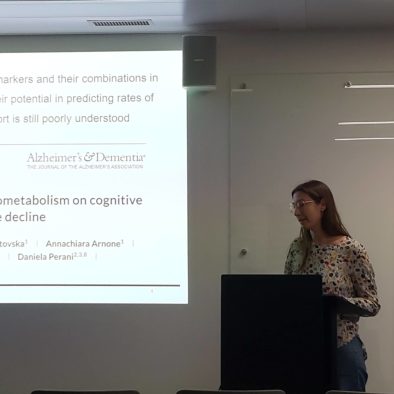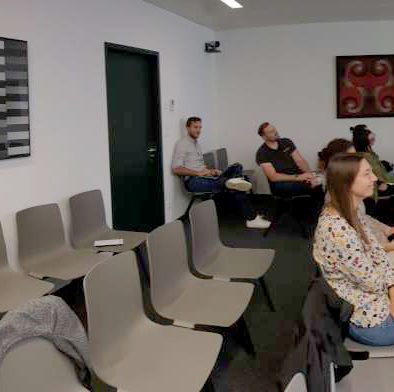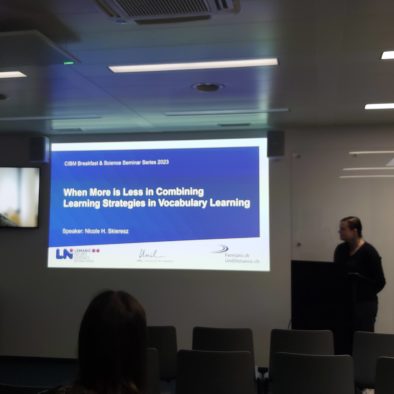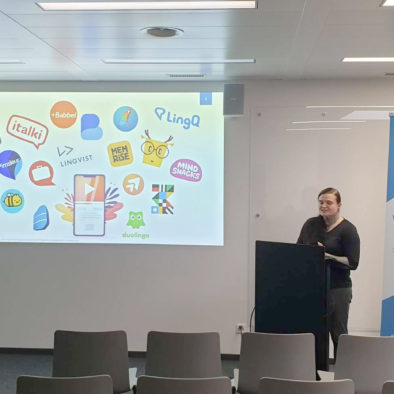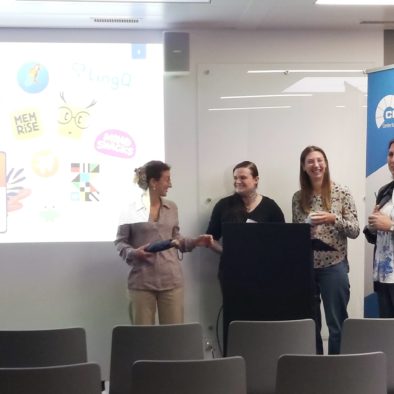Cecilia Boccalini,
University of Geneva, Geneva University Neurocenter and Faculty of Medicine, Laboratory of Neuroimaging and Innovative Molecular Tracers (NIMTlab). Vita-Salute San Raffaele University, Milan, Italy. IRCCS San Raffaele Scientific Institute, Division of Neuroscience, In Vivo Human Molecular and Structural Neuroimaging Unit
The impact of tau deposition and hypometabolism on cognitive impairment and longitudinal cognitive decline
Abstract:
Tau and neurodegeneration strongly correlate with cognitive impairment, as compared to amyloid in Alzheimer’s disease. However, their contribution in explaining cognition and predicting cognitive decline in memory clinics remains unclear.
We included 94 participants with MMSE, tau-PET, amyloid-PET, FDG-PET, and MRI scans from Geneva Memory Center. Linear regression and mediation analyses tested the independent and combined association between biomarkers and cognitive performance and decline. Linear mixed-effects and Cox proportional hazards models assessed biomarkers’ prognostic values.
Metabolism in lateral-temporal regions had the strongest association with cognition (p=0.551; p<0.001), followed by tau in the same regions (r= -0.487; p<0.001). Neocortical tau was associated with decline showing the strongest association (r=-0.602; p<0.001), followed by amyloid, metabolism, and atrophy. Metabolism mediated more strongly the baseline association between tau and cognition as compared to the association between tau and decline. Tau positivity predicted cognitive decline better than neurodegeneration, amyloid, and baseline cognitive status, and represented the strongest risk factor for decline (hazard ratio=37.28; 95% confidence interval=7.01-198.45).
Our results are consistent with tau and metabolism synergistically contributing to cognitive impairment. Neurodegeneration, more accurately assessed with metabolism as compared with atrophy, drives concurrent cognitive performance while neocortical tau drives decline. The superior value of tau for predicting cognitive changes supports tau-PET as a prognostic tool in memory clinics.
About the speaker:
Cecilia Boccalini is a PhD candidate in Cognitive Neuroscience working at the Laboratory of Neuroimaging and Innovative Molecular Tracers (NIMTlab) (University of Geneva, Geneva, Switzerland) and in parallel at Vita-Salute San Raffaele University (Milan, Italy). Her research interests focus on understanding the effects of pathology on the clinical expression of neurodegenerative diseases. Cecilia mainly works on molecular neuroimaging, namely positron emission tomography (PET), a tool offering the possibility to in vivo measure protein deposits, brain metabolism, and neurotransmission. Her PhD project deals with the study of neurodegenerative diseases, including Alzheimer’s disease and Parkinson’s disease, using different neuroimaging approaches with the final aim to be able to separate clinical phenotypes and trajectories.
Supervisors: Valentina Garibotto (UNIGE), Daniela Perani (Vita-Salute San Raffaele University)
Nicole Skieresz,
UniDistance Suisse, Faculty of Psychology, Brig, Switzerland. Lausanne University Hospital and University of Lausanne, Department of Diagnostic and Interventional Radiology, The LINE (Laboratory for Investigative Neurophysiology), Lausanne, Switzerland. The Sense Innovation and Research Center, Lausanne and Sion, Switzerland
When more is less in combining learning strategies in vocabulary learning
Abstract:
Research on memory has identified various learning strategies that support knowledge acquisition. Some of the most effective learning strategies are retrieval practice (i.e., an active process to recall previously learned information), multisensorial learning (i.e., the to-be-learned material is presented to multiple senses simultaneously), and corrective feedback (i.e., a correct response is provided when an error is made). While each on its own has been thoroughly examined, little research has been conducted on potential interactions between different learning strategies and their underlying neurophysiological correlates. We investigated interactions between the learning strategies on associative memory (vocabulary acquisition) and their neurophysiological correlates, focusing on the N400 component of the event-related potential – a marker for semantic violations.
Healthy adults learned Finnish (L2) vocabulary using a mobile application where the proportion of retrieval, sensory modality, and feedback on individual translations was varied. Before and after 14 days of learning, vocabulary knowledge was assessed in a vocabulary test and a recognition task, wherein congruent and incongruent word pairs had to be identified. Simultaneously, high-density EEG was recorded. By combinations of learning strategies, we compared performance metrics and N400 features over time and hypothesized a larger N400 effect after successful learning. Our results show performance improves over time, presumably indicative of learning. While N400 also significantly increased with learning, there was no additional modulation from combined learning strategies versus one strategy alone. While we cannot exclude a ceiling effect on N400 learning effects, our results nonetheless raise the possibility of constraints on when combined strategies may not reveal additional benefits and may thus streamline teaching and app development strategies.
About the speaker:
Nicole Skieresz obtained her Bachelor’s degree in Cognitive Science in 2017 at the University of Osnabrück in Germany and a Master’s degree in Psychology in 2019 from the University of Fribourg (Switzerland). In 2019 she started as a research assistant in the project School of Tomorrow at UniDistance Suisse investigating the added value of digital learning tools and the neuropsychological correlates of language acquisition under the supervision of Prof. Nicolas Rothen and Prof. Thomas Reber. She joined The LINE in 2021 to complete a Ph.D. under the supervision of Prof. Micah Murray. Her thesis research aims to investigate the potential interactions of learning strategies (i.e., retrieval practice, sensoriality, feedback, spacing) on vocabulary learning and their neurophysiological correlates, focusing on the N400 event-related potential.
Supervisors: Nicolas Rothen, Thomas Reber (UniDistance), Micah Murray (UNIL)
The monthly meet-up seminar series is a great environment to ask questions or to share insights on challenges and solutions. It’s also a good way to broaden and enrich professional networks.
Revisit past seminars and stay tuned for the next CIBM Breakfast and Science Seminar.


